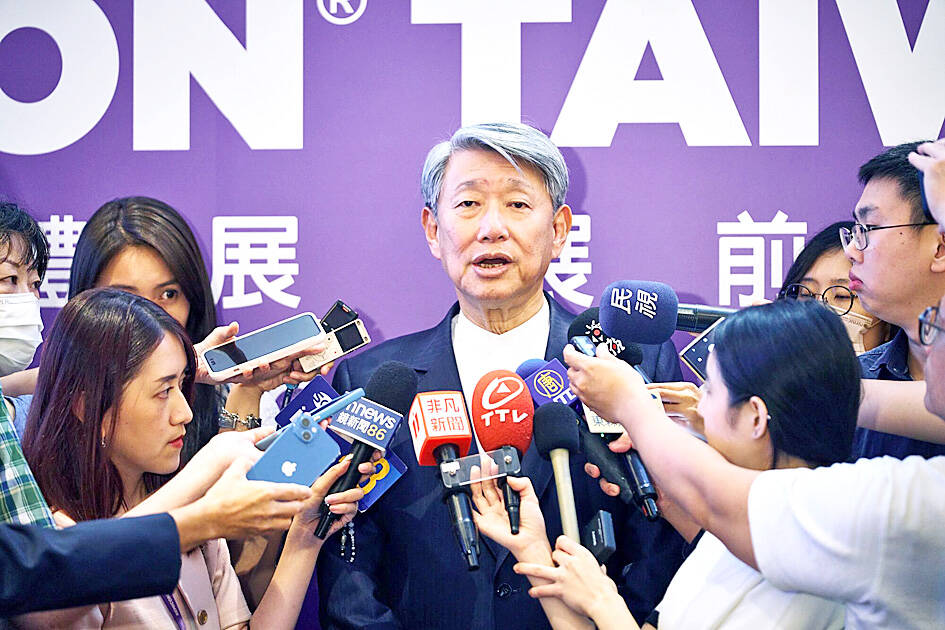Minister of Economic Affairs J.W. Kuo (郭智輝) yesterday said Taiwan’s government plans to set up a business service company in Kyushu, Japan, to help Taiwanese companies operating there.
“The company will follow the one-stop service model similar to the science parks we have in Taiwan,” Kuo said. “As each prefecture is providing different conditions, we will establish a new company providing services and helping Taiwanese companies swiftly settle in Japan.”
Kuo did not specify the exact location of the planned company but said it would not be in Kumamoto, the Kyushu prefecture in which Taiwan Semiconductor Manufacturing Company (TSMC, 台積電) has a fab and is preparing to build another one.

Photo: An Rong Xu, Bloomberg
Different prefectures in Kyushu are offering different incentives for foreign companies, "so the service company we set up will help organize the information and facilitate the 'localization' of Taiwanese enterprises," Kuo said.
Nagasaki, Oita, Miyazaki, and Kitakyushu are some of the Kyushu prefectures that have expressed interest in welcoming Taiwanese companies, he said.
Currently, the plan is limited to Kyushu, he said in response to a question on whether other Taiwanese one-stop service centers will be set up in Japan in the future.
Photo: Grace Hung, Taipei Times
"For other areas such as Kansai and Kanto, it would depend on the nature of the local industries, as most of the Taiwanese companies currently in Japan are part of the supply chain [for the semiconductor industry]," Kuo said.
Asked about a report that TSMC was planning to build a third fab in Japan, Kuo said that question should be directed to the company.
A Japanese media outlet on Sunday quoted Kuo as saying that TSMC would build a third fab in Japan to produce leading-edge chips after 2030.
Kuo, who was doorstepped by reporters ahead of a news conference for this week’s Semicon Taiwan exhibition, also pushed back at criticism of Taiwan by US Republican presidential nominee and former president Donald Trump, and denied that Taiwan took the US chip industry.
“Of course Taiwan is not stealing the chip industry from the US,” Kuo told reporters in Taipei. “The chips we made are commissioned by US companies, which still have the highest gross margin. Trump might have some misunderstanding on such matters, and we will clarify that.”
Trump rattled Taiwan officials and the country’s markets with comments published on July 16 in Bloomberg Businessweek that criticized Taiwan over its chip sector and urged it to pay the US for protection.
That has raised fears that if Trump succeeds US President Joe Biden, who has repeatedly said the US would defend Taiwan from a Chinese attack, he would be less committed, viewing Taiwan in transactional terms.
“Taiwan took our chip business from us,” Trump said at the time. “I mean, how stupid are we? They took all of our chip business. They’re immensely wealthy.”
Since Trump’s comments, Taiwanese officials have tried to talk up the nation’s efforts to uphold its part of the relationship.
In response to Trump’s call for Taiwan to “pay” the US for protection, Premier Cho Jung-tai (卓榮泰) said the country has increased defense spending and extended the conscription period.
“It’s our shared responsibility and goal to maintain the peace and stability in the Taiwan Strait and the Indo-Pacific region,” Cho said on July 17.

SELL-OFF: Investors expect tariff-driven volatility as the local boarse reopens today, while analysts say government support and solid fundamentals would steady sentiment Local investors are bracing for a sharp market downturn today as the nation’s financial markets resume trading following a two-day closure for national holidays before the weekend, with sentiment rattled by US President Donald Trump’s sweeping tariff announcement. Trump’s unveiling of new “reciprocal tariffs” on Wednesday triggered a sell-off in global markets, with the FTSE Taiwan Index Futures — a benchmark for Taiwanese equities traded in Singapore — tumbling 9.2 percent over the past two sessions. Meanwhile, the American depositary receipts (ADRs) of Taiwan Semiconductor Manufacturing Co (TSMC, 台積電), the most heavily weighted stock on the TAIEX, plunged 13.8 percent in

A wave of stop-loss selling and panic selling hit Taiwan's stock market at its opening today, with the weighted index plunging 2,086 points — a drop of more than 9.7 percent — marking the largest intraday point and percentage loss on record. The index bottomed out at 19,212.02, while futures were locked limit-down, with more than 1,000 stocks hitting their daily drop limit. Three heavyweight stocks — Taiwan Semiconductor Manufacturing Co (TSMC, 台積電), Hon Hai Precision Industry Co (Foxconn, 鴻海精密) and MediaTek (聯發科) — hit their limit-down prices as soon as the market opened, falling to NT$848 (US$25.54), NT$138.5 and NT$1,295 respectively. TSMC's

ASML Holding NV, the sole producer of the most advanced machines used in semiconductor manufacturing, said geopolitical tensions are harming innovation a day after US President Donald Trump levied massive tariffs that promise to disrupt trade flows across the entire world. “Our industry has been built basically on the ability of people to work together, to innovate together,” ASML chief executive officer Christophe Fouquet said in a recorded message at a Thursday industry event in the Netherlands. Export controls and increasing geopolitical tensions challenge that collaboration, he said, without specifically addressing the new US tariffs. Tech executives in the EU, which is

In a small town in Paraguay, a showdown is brewing between traditional producers of yerba mate, a bitter herbal tea popular across South America, and miners of a shinier treasure: gold. A rush for the precious metal is pitting mate growers and indigenous groups against the expanding operations of small-scale miners who, until recently, were their neighbors, not nemeses. “They [the miners] have destroyed everything... The canals, springs, swamps,” said Vidal Britez, president of the Yerba Mate Producers’ Association of the town of Paso Yobai, about 210km east of capital Asuncion. “You can see the pollution from the dead fish.